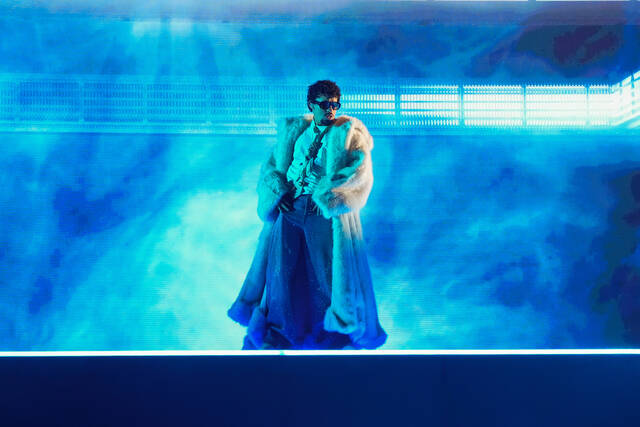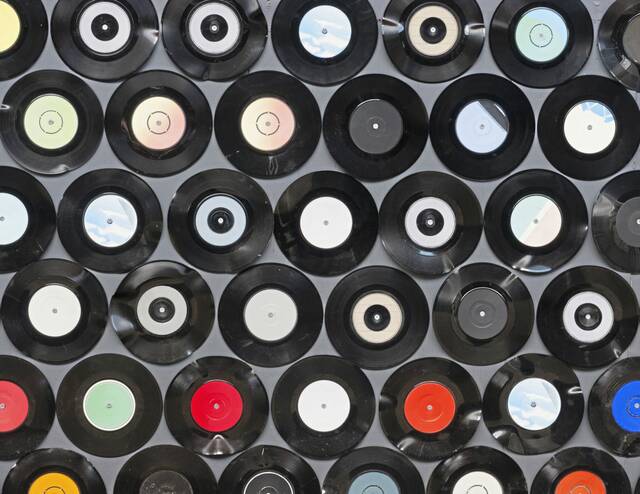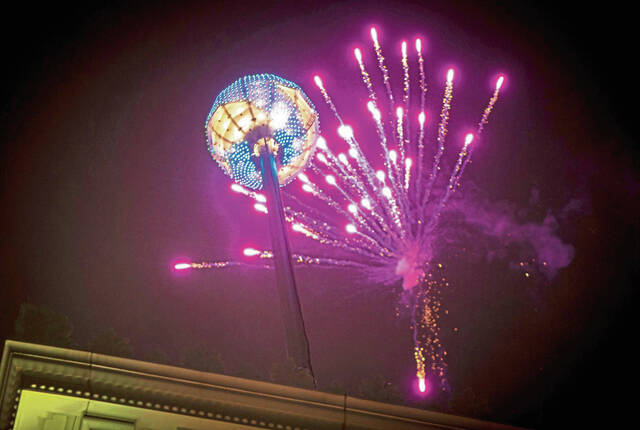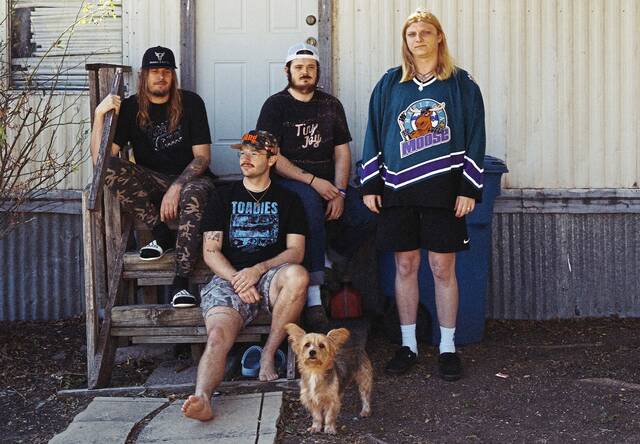As Mdou Moctar prepared to launch their tour in support of an upcoming acoustic album, bassist Mikey Coltun was looking forward to the spontaneity of it.
“We’ve never done it,” Coltun said last week. “We’ve played together acoustically many times and obviously recorded acoustically, but we’ve never done an acoustic tour, so we’re trying some new things and we’re all super excited about it.”
The band, which bears the name of its singer/guitarist Mdou Moctar, is releasing “Tears of Injustice” on Feb. 28 via Matador Records, rearranging and re-recording the band’s 2024 “Funeral for Justice” album with acoustic and traditional instruments.
Moctar, who was born in Niger, is joined by rhythm guitarist Ahmoudou Madassane and drummer Souleymane Ibrahim, alongside the U.S.-based Coltun, with their music blending Western rock with contemporary African sounds. Their tour, which just kicked off last week, visits the Carnegie Lecture Hall in Oakland on Wednesday as part of The Andy Warhol Museum’s Sound Series, with Janel Leppin opening.
According to Coltun, every night is different, with about 95% of the show improvised.
“With Mdou, with the band, there’s always some sort of rehearsal, but it’s very much a see-what-happens sort of thing and Mdou likes to keep it spontaneous,” Coltun said. “We never do a set list or anything, and we never talk about the music we’re gonna do, so it’s just everybody’s got to be on their toes.
“And there’s a huge songbook of tunes — and not even just Mdou tunes, but traditional wedding tunes from Niger — and everyone kind of knows that and you kind of just hear a melody and you go.”
In a call last week from New York, Coltun discussed the new album, his dislike of the term “world music” and more:
Did the revamped album come together smoothly?
Yeah, that was also a situation where we didn’t rehearse ahead of time. We talked about doing this album, and I found a studio that I felt was the right fit so we didn’t have to wear headphones and we could all be in the same room. We just kind of started jamming and someone would be like, ‘Oh, that’s cool. That feels cool. Let’s try that for this for this song.’ And so it was pretty spontaneous and one take mostly for all the tracks, which is kind of how any Mdou record is made.
Did somebody have the idea to do this or was it just something that just came up in conversation, like we should try this out?
We had been talking about doing acoustic versions of these songs for a while and writing the record on tour and sitting down, Ahmoudou, Mdou and I, talking about the lyrics and stuff.
Mdou always has an acoustic guitar, so it’s pretty natural to have that sound, and it’s a very different sound than the electric sound. So it was a pretty easy adjustment to change to the acoustic vibe, just kind of playing around with different feels because we didn’t want it to be the same as the electric record, so it was kind of an Mdou collaborative idea on making this record.
From what I’ve read, this type of music traditionally doesn’t have bass, so how did you find where you fit in musically?
For me, it was very musically similar and energy-wise to punk music that I grew up listening to and playing. And between that and then a band I was in before with a singer from Sierra Leone, that style was called Bubu music, and it’s like old witchcraft music played super fast. And so that was kind of like a boot camp for this stuff, because it’s always long forms, it’s repeating the same rhythms, and it’s morphing and everything, but it just keeps getting faster and faster.
I think with any sort of West African music that I studied, it’s all about finding a line or doubling a line that’s there. And that’s kind of how I approached it at the beginning, and Mdou really likes that. But, yeah, it’s like, Tuareg music traditionally doesn’t have bass, but there are bands like Tinariwen from Mali (where) the bass is kind of the most important role. So it’s about finding that balance between there’s two guitars and drums versus bass being the most important thing in kind of a slower Tuareg band.
Related
• Interview: Stephen Wilson Jr. on 'son of dad' deluxe album, science in songwriting, Nirvana and more• Review: Billy F. Gibbons and the BFGs unleash bluesy night of ZZ Top classics, covers
• 2025 Pittsburgh area concert calendar
Do you bristle at the term world music? That seems like such an outdated term and it doesn’t really fit?
I hate that term.
How would you describe the band and music?
I think it’s no different than any other rock band. I mean you could take it out of one box — the world music box — and throw it into another box, but ultimately it’s just kind of whatever somebody takes from it. But I think the term world music has a negative connotation for me and for a lot of people. We started playing at kind of world music events and such, and it’s a very dominated by an older white male crowd and often seated as well, and that never felt good. As soon as we moved into a different world, it was pretty apparent that this is kind of the right thing to do. I think it’s unfair that bands get lumped into that category if they’re from a different country outside of North America and Europe.
Is there ever a worry about the message of the lyrics getting lost in translation when the majority of the audience probably doesn’t understand the language?
Yeah, there’s definitely that, but I think that we try to have the music match as much of the lyrics as possible, so the intensity of the music I think is what people feel and can sense that there is a message there. In all of our records, there are lyric translations and so the hope is that somebody buys the record and reads a bit more about what’s going on in Africa, what’s going on in Niger and ultimately how that’s affecting the world and very similar to what’s going on everywhere else.
What are some of the biggest takeaways from what you’ve learned having to play a number of different roles for this band: driver, manager, translator, a little bit of everything?
Patience and just kind of creatively pivoting are kind of big takeaways. Definitely things run differently in West Africa than over here and and especially you say, like, OK, we’re leaving at 8 in the morning and it’s not really a thing. It’s not as respected over there. It’s just kind of like, oh, it’ll happen.
And same thing with visas. We always get our visa, (but) it’s never easy to get a visa for these guys, even if it’s like, OK, their visas are approved. It’s always the extra task. Is there anybody in the embassy to give them a stamp? What happens when they give them a stamp, but it’s on the wrong page? It’s on the important page of all the information of people, so it’s always about figuring out a solution quickly and creatively. I think that’s a big takeaway that I’ve gotten from this group.








